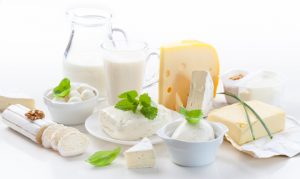 Dairy foods like ice cream, regular cheese and whole milk are high in fat and saturated fat, linked to an increased risk for heart disease. There is little evidence that total dietary fat affects cancer risk, but it is less clear whether specific high fat foods or types of fats affect cancer risk.
Dairy foods like ice cream, regular cheese and whole milk are high in fat and saturated fat, linked to an increased risk for heart disease. There is little evidence that total dietary fat affects cancer risk, but it is less clear whether specific high fat foods or types of fats affect cancer risk.
Now, a new study published in the Journal of the National Cancer Institute suggests that, for breast cancer survivors, consuming high fat dairy foods may be related to an increased risk of breast cancer mortality.
The researchers followed 1893 women diagnosed with early-stage invasive breast cancer who were enrolled in the Life After Cancer Epidemiology (LACE) study. The participants completed food frequency questionnaires, including how much dairy they consumed, when they entered the study and in 6 year follow-up surveys. In this study median follow-up was 11.8 years.
In the study, women who consumed the most high-fat dairy foods (more than 1 serving/day) had a 49 per cent increased risk of dying from breast cancer compared to those who consumed the least amount of high-fat dairy (less than one-half serving/day). The researchers adjusted for many factors including smoking, BMI, physical activity, age, cancer stage, and meat, fiber and alcohol consumption.
Low-fat dairy and overall dairy intake did not link to breast cancer recurrence or breast cancer survival.
The authors suggested that estrogenic hormones in milk fat may be one reason that high fat dairy would link to poorer breast cancer outcomes. Exposure to estrogens is a major risk factor for breast cancer.
The researchers noted that this is the first study to look at the connection specifically between high-fat dairy products and breast cancer recurrence and survival and that future studies in larger cohorts are important to confirm this finding.
The AICR/WCRF Continuous Update Project Breast Cancer Report found only limited evidence of a link between milk and dairy products and risk for breast cancer. Factors found to increase breast cancer risk are body fatness (for post-menopausal breast cancer) and alcohol. Physical activity and lactation protect against breast cancer.
There are already good reasons to limit how much ice cream, regular cheese and whole milk you consume. These foods contain a lot of calories per bite, making it easier to eat too many calories that may lead to unwanted weight gain. Overweight and obesity is linked to higher risk for seven cancers, including post-menopausal breast.
Dairy foods are an excellent source of calcium and vitamin D, but you can choose nonfat and 1% milk, yogurt and cottage and reduced fat cheeses as a way to keep calories lower and limit how much saturated and dairy fat you consume.
If you don’t include dairy in your diet, good substitutes include calcium and vitamin D fortified plant-based milks and related products, like soy milk or almond milk.






I am reading the China Study and some of the information about dairy seems to be contradictory. You are saying that Dairy is an excellent source of calcium which is true however 1. is dairy acidic and 2. What about casein and links to cancer?
Hi Scott,
I’ve written about the acid/alkaline diet concerns on a previous blog and that has more info than I can post on a comment: http://www.aicr.org/2010/07/08/another-cancer-and-diet-claim-the-alkaline-diet/
As for casein and links to cancer the AICR/WCRF expert report and continuous updates so far find that evidence on casein and cancer risk (that meets the systematic literature review criteria) is too limited to evaluate.
Calcium/dairy and cancer risk is complicated – here is some information on calcium and cancer risk: http://www.aicr.org/foods-that-fight-cancer/soy.html#ask-the-expert
Thanks for your question and for your interest.
Is Organic Milk, Ice Cream , and Chicken safer than all other items in the grocery store , if you use them for substitutes and cook wisely. My mom is diabetic and has lost a lot of weight they suggested milkshakes for a good snack to help to stimulate her appetite.
Robin
Hi Robin,
Here’s a link to an answer to a question about organic foods: http://www.aicr.org/patients-survivors/patients_survivors_after_treatment_faqs.html#organic
Although this references fruits and vegetables specifically, it can also be applied to other healthful foods.
Alice